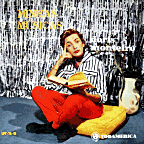 Doris Monteiro "Minhas Musicas" (Todamerica, 1954) (LP)
Doris Monteiro "Minhas Musicas" (Todamerica, 1954) (LP)
This 8-song album includes her first recording, "So Voce Se Importasse," in which Monteiro's thin, teenaged voice is arresting both for its youth and for her expressiveness and skillful delivery. Some tracks share this vocal tone, while others were clearly recorded a few years later, with her voice already changing with age... The arrangements are old-fashioned, but not fusty. Classy stuff from an artist who was never entirely part of the samba and bossa nova scene... It's cool to go back here and see how far back her ballad-singing roots go... Recommended!
Doris Monteiro "Confidencias De Doris Monteiro" (Continental Records, 1956) (LP)
An early, 8-song LP with arrangements by composer Fernando Cesar; all eight songs were included in the 1960 album, Vento Soprando, reviewed below... This features lush, lavish orchestrations, and some of it is a bit much. But it's also grand romantic music, with Monteiro firmly in the syrupy bolero tradition... If you enjoy boleros, you might want to check this out -- she has a lovely voice and can readily tap into the overripe emotionality that the style demands.
Doris Monteiro "Doris Monteiro" (Columbia Records, 1957) (LP)
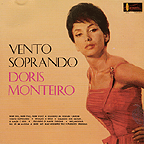 Doris Monteiro "Vento Soprando" (Continental Records, 1960) (LP)
Doris Monteiro "Vento Soprando" (Continental Records, 1960) (LP)
This early album was an expanded version of the Confidencias record of a few years earlier, gathering recordings Monteiro made between 1954-56... All the songs were written or co-written by Fernando Cesar, who worked in a variety of styles, including toadas, boleros and valsas, in addition to good, old-fashioned samba-cancoes. "Old-fashioned" is the key phrase here -- if you've come to this album after first exploring Monteiro's sleek, hip work from the 1970s, you may be taken aback by the schmaltzy, lachrymose tone. This is classic, pre-bossa nova "radio singer" pop: romantic, bombastic, redolent with swooping strings and Monteiro's emotive power. I prefer her later, more reserved, cool style, but if you're looking into the radio singer era, this is fine stuff for the time. Includes arrangements from bandleaders Radames Gnattali and Renato De Oliveira.
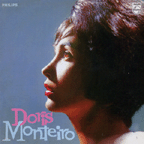 Doris Monteiro "Doris" (Philips, 1961) (LP)
Doris Monteiro "Doris" (Philips, 1961) (LP)
(Produced by Monteiro Da Sousa)
Yet another "last gasp" of the radio singer era, a breezy pop vocals set recorded at the peak of the bossa nova boom. Monteiro doesn't seem particularly compelling here, but she's nice enough... It's classic old-style Brazilian pop production, with tasteful orchestration framing Monteiro's modest voice, but since her own approach is so low-key to begin with, the restrained musical style makes this album seem somewhat negligible. It's pleasant, but doesn't really play up to Monteiro's idiosyncrasies, making her seem like just another sweet-sounding female singer. It's certainly worth checking out, though, close enough to the bossa nova sensibility of the time that it can be appreciated from that vantage point as well...
Doris Monteiro "Doris" (Columbia Records, 1962) (LP)
A sweet, slightly goofy, album, packed with plenty of old-fashioned arrangements, complete with a plunking, waltzy piano, vibraphone, flutes and more. Monteiro's voice is lovely -- youthful, fun, engaged. The music is a little fusty, but that's half the fun. You can hear a little bit of swing peeking around the corners as well... and a bit of her uber-cool persona starting to assert itself. Worth a spin!
Doris Monteiro "Gostoso E Sambar" (Philips, 1963) (LP)
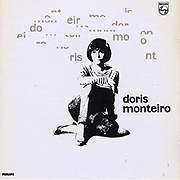 Doris Monteiro "Doris Monteiro" (Philips, 1964) (LP)
Doris Monteiro "Doris Monteiro" (Philips, 1964) (LP)
(Produced by Armando Pittigliani)
Another perfectly nice record, with Monteiro singing solidly within the bossa nova mainstream... It's a pleasant album, though once again her minimalist vocal style may leave Monteiro looking like a second stringer, standing in line behind the likes of Sylvia Telles, Maysa Matarosso and even newcomers like Nara Leao. Here, she's most like Astrud Gilberto, using a small voice to glide inside a large space... She's surrounded by top talent here: Lindolfo Gaya and Walter Wanderley provide arrangements, and Tenorio, Jr. on piano. The repertoire is also striking, with four songs by Marcos Valle, an equal number by Durival Ferreira, as well as a tune or two from Joao Donato, Eumir Deodato and Joao Mello, and a notable absence of material by Tom Jobim, Vinicius De Moraes or the other giants of the bossa scene. It's a strong, creditable album, and while it doesn't really get to the heart of Monteiro's real strengths as a stylist, it's certainly worth checking out.
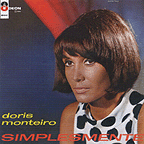 Doris Monteiro "Simplesamente" (Odeon, 1966) (LP)
Doris Monteiro "Simplesamente" (Odeon, 1966) (LP)
(Produced by Milton Miranda & Lyrio Panicali)
An adequate album, though perhaps it will sound underwhelming to listeners of a more critical bent. The material is standard bossa-era fare, while Monteiro's voice is tiny and chirpy, and the arrangements are bent to match her, with perky, treble-heavy production. Several major players of the old-school MPB scene are here: producer Lindolfo Gaya, musical director Lyrio Panicali and his co-arranger, J. T. Mierelles... It sounds okay; maybe there's stuff out there more deserving of your time, but there's certainly worse Brazilian pop music from the era to be found, and Monteiro fans should like this just fine. Worth checking out.
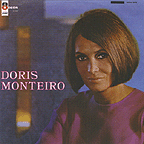 Doris Monteiro "Mudando De Converso" (Odeon, 1969)
Doris Monteiro "Mudando De Converso" (Odeon, 1969)
(Produced by Milton Miranda & Lyrio Panicali)
A beautiful album, sort of the apex of the decade-long evolution of Odeon's sleek, pop-vocals production style. Monteiro still isn't experimenting with "funkiness," but she sounds pretty damn hip, with a cool, relaxed vocal style that suggests an artist somewhat removed from the petty business of making her own art. There's an ironic, icy feel to her persona, suggestive of blase divas such as Marlene Dietrich or Nico, combined with a sweetness and clarity of tone, and a precision of delivery that -- suddenly -- places Monteiro at the top of her class. This is an album that should appeal to fans of Nara Leao's early bossa nova albums, as well as Astrud Gilberto's jazz-oriented work... It's fine, fine music, and certainly one of the first albums I would recommend if you wanted to check Montiero out... Recommended!
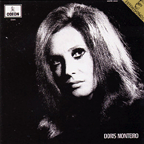 Doris Monteiro "Doris Monteiro" (Odeon, 1970) (LP)
Doris Monteiro "Doris Monteiro" (Odeon, 1970) (LP)
(Produced by Milton Miranda / Lyrio Panicali)
An entirely enjoyable outing, although a bit perky and brisk... Monteiro's more mellow, serious leanings are set aside in favor of a bright, poppy, upbeat sound that's more like Dusty Springfield or Petula Clark than Angela Maria or Dolores Duran. It's a fun record, but in a distinctly kitschy way. Includes a snazzy version of Paulo Diniz's "Brasil Brasa Braseiro," Jorge Ben's "Se Voce Quiser, Mas Sem Bronquear," and songs by Carlos Imperial, Roberto Carlos and Antonio Adolfo, as well as Baden Powell's "gargling" song, "Quaquaraquaqua," all with a goofy, youthful bounce. Definitely worth checking out!
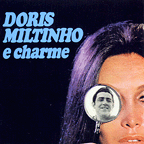 Doris Monteiro & Miltinho "Doris, Miltinho E Charme" (Odeon, 1970) (LP)
Doris Monteiro & Miltinho "Doris, Miltinho E Charme" (Odeon, 1970) (LP)
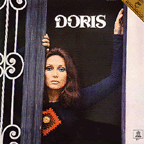 Doris Monteiro "Doris" (Odeon, 1971) (LP)
Doris Monteiro "Doris" (Odeon, 1971) (LP)
(Produced by Milton Miranda & Lindolfo Gaya)
Quite nice. If you wanted to check Monteiro out, this is definitely one of the first albums I would recommend... While the arrangements are based on the horns-and-strings pop style favored by the Odeon label, there's also a playful, up-to-the-moment feel, with inventive arrangements clearly influenced by the rock-tinged tropicalia of Gilberto Gil and Caetano Veloso, and even a touch of Jorge Ben/Black Rio funkiness. Monteiro sounds a lot like Gal Costa did at the time, although in many ways, Doris is much more pleasant to listen to -- she has a similar light vocal tone, but doesn't go overboard with the heavy-handed emoting and wild musical theatrics; she just sings the songs in a cool, clear style that hearkens back to the original reserve of the bossa nova era. This disc really catches Monteiro at her best... Recommended!
Doris Monteiro & Miltinho "Doris, Miltinho E Charme, v.2" (Odeon, 1971) (LP)
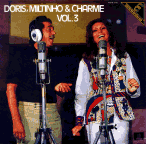 Doris Monteiro & Miltinho "Doris, Miltinho E Charme, v.3" (Odeon, 1972)
Doris Monteiro & Miltinho "Doris, Miltinho E Charme, v.3" (Odeon, 1972)
(Produced by Lindolpho Gaya)
The third album in this duet series... A swell, swinging set, with both artists in fine form, feeling loose, funky and playful. The spotlight is mostly on Monteiro, with Miltinho adding friendly commentary on the side, and occasionally singing lead himself. The backing alternates between swank, jazzy MPB and groovy, clattersome samba, with great percussion throughout. Includes several medley tracks, which are generally fun, although I find them less satisfying than individual, self-contained songs. Worth checking out, if you can track it down.
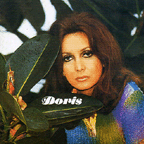 Doris Monteiro "Doris" (Odeon, 1972) (LP)
Doris Monteiro "Doris" (Odeon, 1972) (LP)
(Produced by Milton Miranda & Maestro Gaya)
One of Monteiro's best, and most accessible, albums... This funky, upbeat set features several songs by Sidney Miller, including the swank album opener, "Ora, Acho Que Vou-Me Embora," a modern samba that echoes the playful bounce of Carmen Miranda's classic recordings. The animated orchestrations of "Dose Pra Leao," "Regra Tres," Cesar Costa Filho's "Lero-Lero" and the funk-tinged "Moco" are also highlights... Throughout, Monteiro sheds her cool reserve and takes a lighter, poppier approach that puts her closer in line with the jazz- and pop-tinged leanings of canonical MPB stars such as Chico Buarque, Nara Leao and Gal Costa. If you want to check her out, this would be a fine album to start with.
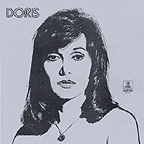 Doris Monteiro "Doris" (Odeon, 1973) (LP)
Doris Monteiro "Doris" (Odeon, 1973) (LP)
(Produced by Milton Miranda & Maestro Gaya)
This album opens on a high note, a cool, fusion-y cover of the well-known Dominguinhos song, "Eu So Quero Um Xoto," which was later recorded by Gilberto Gil. Monteiro's version is a study in rarified cool, with languid vocals that pluck lazily around the margins of the irresistible melody, and a perky little fusion keyboard riff that brings to mind the work of Joao Donato... She also covers a Donato song, "Ate Quem Sabe," as well as songs by less famous songwriters. As with many Monteiro albums, this has a laid-back, chill feel to it, verging on easy listening, but with a peculiar iciness that will keep your attention... Worth checking out.
Doris Monteiro & Miltinho "Doris, Miltinho E Charme, v.4" (Odeon, 1973) (LP)
 Doris Monteiro "Doris Monteiro" (Odeon, 1974) (LP)
Doris Monteiro "Doris Monteiro" (Odeon, 1974) (LP)
(Produced by Milton Miranda & Maestro Gaya)
It kind of feels like she's regressing on this one... It's a chirpy, perky, weightless album that blips back into the generic pop mode she was in in the early 'Sixties... There's nothing embarrassing or disastrous or bad on here, but there's also nothing on it that seems particularly resonant or remarkable. It's okay, but kinda ephemeral.
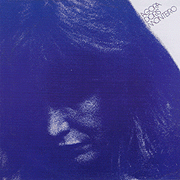 Doris Monteiro "Agora" (EMI-Odeon, 1976) (LP)
Doris Monteiro "Agora" (EMI-Odeon, 1976) (LP)
(Produced by Renato Correa & Milton Miranda / Arrangements by Geraldo Vespar)
One of Monteiro's finest, most substantive albums. On the surface, there's a breezy, poppy feel, an echo of some of the sleazier, soundtrack-y soft pop coming out of Europe and the States at the time... But beyond the outward formalism, there's a deeper level that Monteiro seems to be working on, an uber-cool detachment, less icy here than on earlier albums, but still very cool, self-assured and self-contained. She seems to be performing on a meta-level beyond the trappings of style, off in her own, distinct corner of the universe. Once again, there's a similarity to Astrud Gilberto, although I'd have to say I prefer Monteiro as a singer -- she's more appealing and personable, even if the music itself is more conventional and (on occasion) a little bit cheesier... There's something about this disc in particular, that makes it a masterwork of jazzy, hip minimalism. Definitely worth checking out, although for many listeners, it may sound like just another cheesy Brazilian pop record.
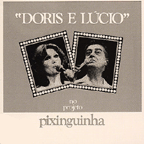 Doris Monteiro & Lucio Alves "No Projeto Pixinguinha" (EMI-Odeon, 1978) (LP)
Doris Monteiro & Lucio Alves "No Projeto Pixinguinha" (EMI-Odeon, 1978) (LP)
(Produced by Milton Miranda & Renato Correa)
You'd think, from the album title, that this would be two veterans of the pre-bossa "radio singer" era teaming up to pay homage to pre-radio singer choro composer, Pixinguinha. Actually, though, this is a smooth set of duets with songs written by the likes of Edu Lobo, Hervilito Martins and Antonio Carlos Jobim, with cool, relaxed, soft-fusion/dinner jazz arrangements and a slight choro-ish bounce in the rhythm... No matter, though, how Pixi-ish it may or may not be, this is also one of the best albums either of these old-timers have made -- the music is solid and they definitely share a strong artistic rapport. Monteiro was at her peak here, and though Alves was long over the hill, he also had the air of a master performer, able to imbue great subtlety into his phrasing and intonation. The album's real strong point, however, is the funky, nimble, fusion-flavored keyboard work, courtesy of Ricardo Albano, Jr. You wouldn't guess it at first glance, but this is a pretty cool album. Worth checking out.
Doris Monteiro "Doris Monteiro" (Continental Records, 1981) (LP)
Doris Monteiro & Tito Madi "Samba Cancao" (Sony, 1992)
Discography -- Best-Ofs
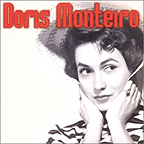 Doris Monteiro "Doris Monteiro" (Eldorado Records, 2000)
Doris Monteiro "Doris Monteiro" (Eldorado Records, 2000)
Monteiro's early work, including her first hit, "Se Voce Importasse," from 1951, and other pre-bossa numbers.
Links


Main Brazil Index

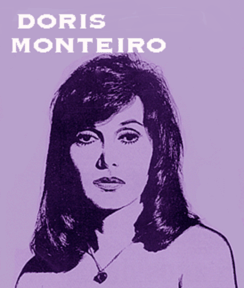 Singer Doris Monteiro (1934-2023) came of age as a featured nightclub and broadcast performer in the golden era of the "radio singers." Her first single was a hit, the 1951 recording of "So Voce Se Importasse," which propelled the 15-year old songbird to national popularity, despite widespread criticism of her reserved, almost deadpan vocal style. Monteiro later found acceptance as a bossa nova singer, and was in fact one of the first artists to record the early works of bossa pioneer Antonio Carlos Jobim. To some, Monteiro has become an icon of cool, sort of MPB's version of Nico -- a blase, laid-back singer whose minimalist style demands the audience come meet her halfway... Here's a look at some of her records...
Singer Doris Monteiro (1934-2023) came of age as a featured nightclub and broadcast performer in the golden era of the "radio singers." Her first single was a hit, the 1951 recording of "So Voce Se Importasse," which propelled the 15-year old songbird to national popularity, despite widespread criticism of her reserved, almost deadpan vocal style. Monteiro later found acceptance as a bossa nova singer, and was in fact one of the first artists to record the early works of bossa pioneer Antonio Carlos Jobim. To some, Monteiro has become an icon of cool, sort of MPB's version of Nico -- a blase, laid-back singer whose minimalist style demands the audience come meet her halfway... Here's a look at some of her records...

 Doris Monteiro "Minhas Musicas" (Todamerica, 1954) (LP)
Doris Monteiro "Minhas Musicas" (Todamerica, 1954) (LP)
 Doris Monteiro "Vento Soprando" (Continental Records, 1960) (LP)
Doris Monteiro "Vento Soprando" (Continental Records, 1960) (LP)
 Doris Monteiro "Doris" (Philips, 1961) (LP)
Doris Monteiro "Doris" (Philips, 1961) (LP)
 Doris Monteiro "Doris Monteiro" (Philips, 1964) (LP)
Doris Monteiro "Doris Monteiro" (Philips, 1964) (LP)
 Doris Monteiro "Simplesamente" (Odeon, 1966) (LP)
Doris Monteiro "Simplesamente" (Odeon, 1966) (LP)
 Doris Monteiro "Mudando De Converso" (Odeon, 1969)
Doris Monteiro "Mudando De Converso" (Odeon, 1969)
 Doris Monteiro "Doris Monteiro" (Odeon, 1970) (LP)
Doris Monteiro "Doris Monteiro" (Odeon, 1970) (LP)
 Doris Monteiro & Miltinho "Doris, Miltinho E Charme" (Odeon, 1970) (LP)
Doris Monteiro & Miltinho "Doris, Miltinho E Charme" (Odeon, 1970) (LP)
 Doris Monteiro "Doris" (Odeon, 1971) (LP)
Doris Monteiro "Doris" (Odeon, 1971) (LP)
 Doris Monteiro & Miltinho "Doris, Miltinho E Charme, v.3" (Odeon, 1972)
Doris Monteiro & Miltinho "Doris, Miltinho E Charme, v.3" (Odeon, 1972)
 Doris Monteiro "Doris" (Odeon, 1972) (LP)
Doris Monteiro "Doris" (Odeon, 1972) (LP)
 Doris Monteiro "Doris" (Odeon, 1973) (LP)
Doris Monteiro "Doris" (Odeon, 1973) (LP)
 Doris Monteiro "Doris Monteiro" (Odeon, 1974) (LP)
Doris Monteiro "Doris Monteiro" (Odeon, 1974) (LP)
 Doris Monteiro "Agora" (EMI-Odeon, 1976) (LP)
Doris Monteiro "Agora" (EMI-Odeon, 1976) (LP)
 Doris Monteiro & Lucio Alves "No Projeto Pixinguinha" (EMI-Odeon, 1978) (LP)
Doris Monteiro & Lucio Alves "No Projeto Pixinguinha" (EMI-Odeon, 1978) (LP)
 Doris Monteiro "Doris Monteiro" (Eldorado Records, 2000)
Doris Monteiro "Doris Monteiro" (Eldorado Records, 2000)


